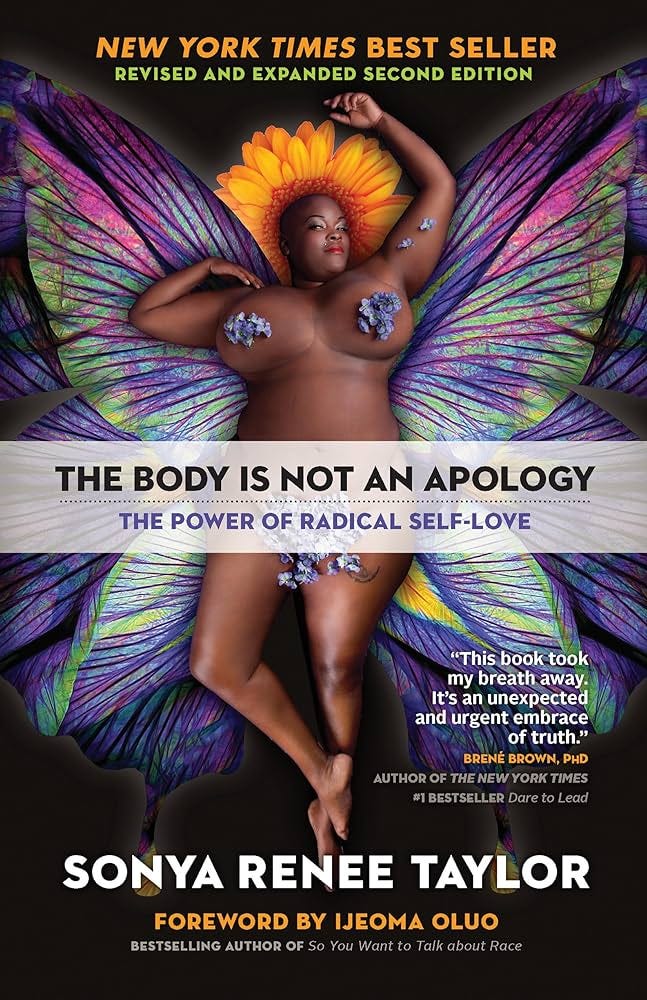Finding Ease with Radical Self-Love
Plus thoughts on the Body-Shame Profit Complex in the yoga industry
We’ve had a double whammy of winter storms in early January, complete with snow and sub-zero temperatures. Suffice it to say this former California girl is struggling! But winter weather is perfect for catching up on reading.
One book that’s been on my “to-read” shelf for months is The Body is Not an Apology: The Power of Radical Self-Love by Sonya Renee Taylor. To be honest, I’d been kind of avoiding this book because I knew it would make me confront some hard realities about how I relate to my body. And it did not disappoint.
We are told repeatedly by society, the media, and sometimes even our loved ones that the ideal body is thin, white, and able. These messages, these perfect pictures shape the way we think about and relate to our body to the point where it can be difficult to separate ourselves from them
Taylor’s book is an invitation for us to no longer apologize for the bodies we have and to practice radical self-love. Radical self-love goes beyond simply accepting our bodies to a place where we can truly love our bodies regardless of our weight, height, race, (dis)ability, or sexual orientation. She asks us to divest from what she calls the Body-Shame Profit Complex. Taylor claims, “Our economic systems shape how we see our bodies and the bodies of others, and they ultimately inform what we are compelled to do and buy based on that reflection.” (p. 45)
Although I didn’t have a name for it, I’ve been aware of the Body-Shame Profit Complex ever since I became a teenager; however, it’s only been in the past few years that I’ve been consciously working to unravel my behaviors and thought patterns that have been engrained in me to think that I always need to fix something about my body and appearance. This unraveling seems endless — every time I peel off another layer, there’s another to work through and The Body is Not an Apology revealed several more layers waiting to be excavated.
Body-Shame Profit Complex in the Yoga Industry
Something that I’ve been reflecting on for awhile is how my yoga practice has simultaneously been a source of healing AND harm in regards to my body image. I used to practice Bikram Yoga practically every day — sometimes twice a day. While it made me feel more confident and strong, I also felt that I had to keep doing it in order to maintain a certain body shape and look.
I mean — #yogaeveryday, right?
On days when my body could have used more rest than another 90-minutes in a hot, humid room, I would often go to yoga class anyway. It was part of the culture and as a yoga teacher, I encouraged others to do the same.
At the end of the day, the yoga industry is a money making endeavor that encourages consumers to buy into the idea that we need the luxury yoga pants, we should look a certain way while doing yoga (ie, thin and muscular), and, if we just keep taking class after class after class, eventually our body will be fixed of all its flaws.

Yoga is so much more than physical practice and I believe it can heal and empower us, but we need to pay attention the messages we get from the media, the yoga industry, and even yoga teachers that override yoga’s intended purpose of union and self-realization.
Radical Self-Love + Activism
In The Body is Not an Apology, Taylor connects radical self-love to advocating against fatphobia, ableism, transphobia, homophobia, and racial inequity. For trans individuals, their sense of themselves and their ability to practice radical self-love is threatened every day by policies and legislation that seek to limit the ways they can move about in the world. For them, practicing radical self-love can be life threatening. (There are currently 7 active anti-trans bills in my home state of North Carolina.)
The more we can love ourselves for who we are and what our bodies look like, the more we see the ways in which systems of power and oppression seek to control how we express ourselves, who we can love, and how we spend our money and resources.
What Radical Self-Love Is and Isn’t
So what does radical self-love really look like? In my opinion, it’s not about bubble baths and massages (although those are fun!). It’s also not about forcing ourselves into thinking positive thoughts about our body or chastising ourselves when we think negative thoughts about our body. Both can make our relationship to our body even worse.
To me, radical self-love is recognizing when I’m having negative thoughts about my body (or other people’s bodies) and being aware that those thoughts aren’t mine. And it’s also about uncovering my true motivations behind exercising, avoiding certain foods, putting on makeup, wearing certain outfits that hide my perceived flaws, etc.
My yoga practice looks a lot different these days as I try to embody the yoga philosophical concepts of Ahimsa (non-violence), Aparigraha (non-attachment), and Svadhyaya (self-study) over society’s idea of what a yoga practitioner should look like, such as the Instagram image above. I still have moments of shame and guilt for not practicing more and for not being able to nail a handstand, but it’s all a work in progress.
Our relationship with our body can be complicated, especially as we age. The The Body Is Not an Apology is a resource to return to over and over, for each phase of life, to remind us that our bodies are created for us and not to satisfy anyone else’s expectations or agenda.
The Substack Dilemma
If you’re not aware, there have been some ongoing issues with Substack being a platform for people who engage in hate speech and misinformation, allowing them to proliferate and monetize their messages. Many Substack writers have left in protest. At the moment, I haven’t decided whether I’ll stay on Substack or move my content elsewhere. I like the platform and the features it provides, but I’ve lost a lot of faith in Substack’s leaders.
In any case, if you’re a subscriber to Finding Ease, I’ll make sure that you continue to get notifications about when new posts come out. Thanks again for being here!






Really interesting and thought-inspiring post, Veronica! I look forward to reading the book you shared. <3
This is a wonderful meditation, Veronica. I need it. And I'll share it! -Sally